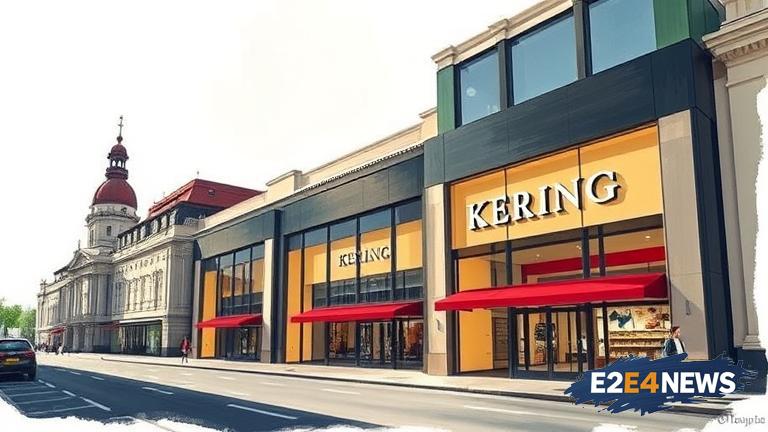Kering, the French multinational luxury goods conglomerate, has announced a substantial decline in its financial performance, citing a challenging market environment and increased competition. The company, which owns renowned brands such as Gucci, Yves Saint Laurent, and Alexander McQueen, reported a significant drop in sales and revenue. This decline is attributed to a combination of factors, including a slowdown in the global economy, changing consumer behavior, and intense competition in the luxury goods market. The COVID-19 pandemic has also had a lasting impact on the industry, with many consumers opting for more affordable and sustainable options. As a result, Kering’s sales have plummeted, leading to a substantial loss in revenue. The company’s financial woes are a cause for concern, as it struggles to maintain its position in the competitive luxury market. Despite efforts to revamp its brands and expand its product offerings, Kering continues to face significant challenges. The company’s management has acknowledged the difficulties and is working to implement a turnaround strategy. This includes investing in digital transformation, enhancing customer experience, and exploring new markets. However, the road to recovery is expected to be long and arduous, with many analysts predicting a prolonged period of decline. The luxury goods market is highly competitive, with numerous players vying for market share. Kering’s brands, while iconic and prestigious, are not immune to the challenges facing the industry. The company must adapt to changing consumer preferences and behaviors, while also navigating the complexities of the global economy. In recent years, Kering has made significant investments in its digital capabilities, aiming to enhance the online shopping experience and increase engagement with its customers. Nevertheless, the company still faces significant hurdles, including the need to balance creativity and innovation with commercial viability. The financial losses reported by Kering are a stark reminder of the challenges facing the luxury goods industry. As the company works to restore its financial health, it must also contend with the ongoing impact of the COVID-19 pandemic, which has disrupted global supply chains and altered consumer behavior. Furthermore, the rise of sustainable and affordable fashion has led to a shift in consumer preferences, with many opting for more eco-friendly and budget-friendly options. In response, Kering has pledged to increase its focus on sustainability, aiming to reduce its environmental footprint and promote more responsible practices throughout its supply chain. While this commitment is commendable, it remains to be seen whether it will be enough to restore the company’s financial fortunes. The future of Kering and its brands remains uncertain, as the company navigates the complexities of the luxury goods market. With intense competition, changing consumer behavior, and ongoing economic uncertainty, Kering’s management faces significant challenges in restoring the company’s financial health. As the company works to implement its turnaround strategy, it must also contend with the ongoing impact of the COVID-19 pandemic and the rise of sustainable and affordable fashion. Ultimately, the success of Kering will depend on its ability to adapt to changing market conditions, innovate and differentiate its brands, and restore consumer confidence in its products. The company’s financial woes serve as a reminder of the challenges facing the luxury goods industry, where creativity, innovation, and commercial viability must be carefully balanced. As Kering works to restore its financial health, it must also prioritize sustainability, social responsibility, and customer experience, in order to remain competitive in a rapidly evolving market.
